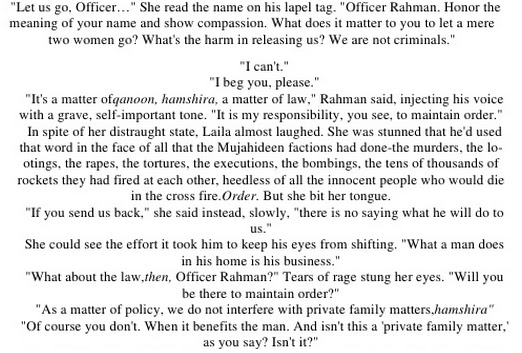I watched this video a while back and immediately regretted doing so. The HijabiBengaliSisters page kept popping up on my Facebook so I wanted to check out their videos, and I wanted to respond to it since the girl has brought up a sensitive issue and has gone about justifying it in a retarded way.
She starts off by saying how in Islam, women and men have different roles and both should be seen equally. She says women should not try to emulate men in the name of feminism etc etc, upto which I can moderately tolerate. Then she goes onto say that in Islam men have to provide for their wives and give them everything they wish for, and so women should not complain of 'marital rape' because they should reward their husbands for all that they do. At this point I just wanted to punch her in the face.
She just said that the duties of men and women are different but equally valuable, then she said a woman should never refuse sex because her husband does 'so much' for her. By doing that she has completely contradicted her own statement by downgrading the value of 'women's work' (cleaning, cooking, looking after children etc) in comparison to men's work. If a woman's work deserves equal treatment, then her unwillingness to engage in sex should be respected as much as a man's willingness to do so. She then says a woman should 'serve' and 'obey' her husband because she'll receive much more in return. So essentially a woman should exchange her servitude and obedience for love, home, money and gifts. How are the roles equal then? Sounds more like a master-slave dynamic to me.
This girl needs to learn that marital rape is not a joke. Rape, marital or not, is less about sexual desire than it is about “an abuse of power by which one person attempts to establish dominance and control over the other”. If this girl had done some basic research, she would see that marital rape is often accompanied by domestic violence and abuse, and because it occurs repeatedly over a long time the accumulated trauma may have greater impacts on a woman's psychology than being raped by a stranger. Allowing a man to have his way with you is not about giving him a 'break', it's about handing over your autonomy to the man. It's not about rewarding him, it's about making him feel more powerful. I feel no shame in repeating once more, that this girl's views are imbecilic of tremendous proportions. She should familiarise herself with legal definitions before posting a blanket statement about marital rape on YouTube.
She further contradicts her "women and men are different but equal" statement by saying men are stronger than women, (2 women equal to one man, apparently) and are therefore naturally a "grade higher" than women, because they can protect them. This is an absurd presumption, as strength has the power to both protect AND destroy. And if she has interpreted the 2 women = 1 men quote from the Quran in this way, then she hasn't read the verse properly, because it has nothing to do with strength, but everything to do with a woman's ability to testify in court.
I'm extremely saddened that young ladies brought up in developed, 21st century environments can openly hold regressive views like this and still attract admirers. I also had the pleasure of watching another video by her about how "women who don't cover up" have nothing to offer as they are submitting to the wishes of menfolk.
HA! Oh the irony.




